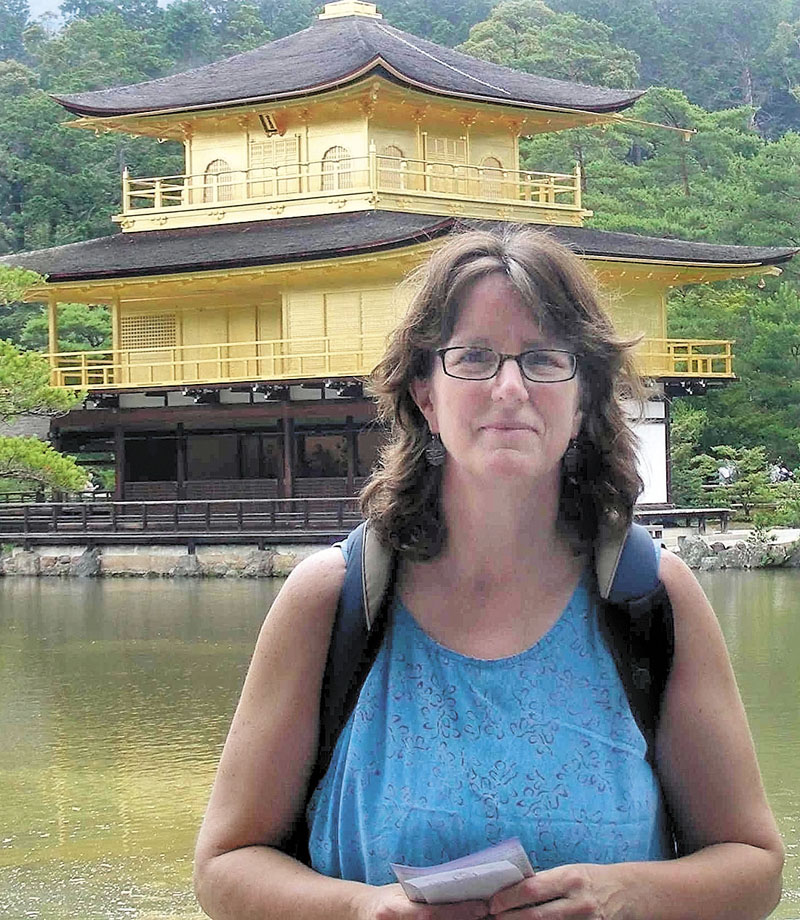WINSLOW — Lisa Ericson and the other visiting educators had tears in their eyes.
Upon entering the gymnasium at Tokiwa Elementary School in Japan, they were met by 750 children, all dressed in white shirts and black shorts or skirts, singing “It’s a Small World,” in both English and Japanese.
“We felt like rock stars. It was really fun,” Ericson said. “It gave us all a real charge.”
Ericson, a seventh grade English teacher, hopes to bring that enthusiasm from her recent whirlwind two-week visit to Japan back to Winslow Junior High School, and explore themes of sustainability and global awareness while maintaining a pen-pal-like collaboration between the two countries.
Ericson, 51, of Waterville, said she came away from the the Japan-U.S. Teacher Exchange Program for Sustainable Development struck by the interesting contrasts between the two countries’ educational systems and ideas on how they can learn from each other.
“My objective was global understanding,” she said.
Ericson was selected from a national pool of more than 450 educators to enter the program, which funds the U.S. teachers’ trips.
The exchange, sponsored by Fulbright Japan, started with Japanese teachers coming to the U.S. in the spring. In April, 48 Japanese teachers tooka a two-week tour of schools and cultural sites, culminating with a three-day joint conference in San Francisco. There, Ericson met her counterpart, Yumie Esaki, from Mitsuhashi Junior High School in Fukuoka Prefecture.
Then, from June 21 to July 5, Ericson traveled to Kobe, a coastal city in southern Japan, to learn about the country’s culture and its schools, particularly its education for sustainable development programs.
It was an education for Ericson. She marveled at the discipline and hard work of students, who even clean school toilets, and the school programs they have that teach about living sustainable lives.
In her proposal to get into the program, Ericson envisioned using Peter Menzel’s book “Hungry Planet” with her students so they could read and write about food waste and sustainability.
To that end, she has ideas for Winslow Junior High, such as improving its recycling program to include better reuse of cafeteria food and boosting its nutritional value. The Japanese, who have a much healthier diet than most Americans, have a lot to teach us about food use, she said.
But it’s a two-way street. Ericson said the Japanese can also learn from us when it comes to teaching children to be creative and use critical-thinking skills.
Teachers from both countries bonded.
In the aftermath of the devastating tsunami, earthquake and nuclear power plant crisis earlier this year, Ericson bought 200 friendship bracelets inscribed “Hope for Japan” and raised about $400 from Winslow students. On the last day of her trip, she delivered the money and friendship bracelets to Misuzu Kurosawa, a teacher whose school was in a region affected by the crisis.
“We called it ‘extending the hand of friendship,'” Ericson said. “I was incredibly proud of my kids. It was just really powerful.”
Ericson said her class and Esaki’s class will write letters back and forth about the topics of awareness and sustainability, and learn from each other.
“They can share short pieces on anything from comparing Mount Katahdin to Mount Fuji,” Ericson said. “It gets the kids talking.”
Scott Monroe — 861-9239
smonroe@centralmaine.com
Send questions/comments to the editors.



Success. Please wait for the page to reload. If the page does not reload within 5 seconds, please refresh the page.
Enter your email and password to access comments.
Hi, to comment on stories you must . This profile is in addition to your subscription and website login.
Already have a commenting profile? .
Invalid username/password.
Please check your email to confirm and complete your registration.
Only subscribers are eligible to post comments. Please subscribe or login first for digital access. Here’s why.
Use the form below to reset your password. When you've submitted your account email, we will send an email with a reset code.